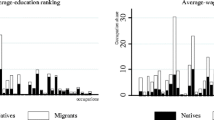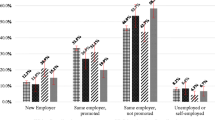Abstract
In this paper we study the occupational progress and earnings attainment of immigrants in Germany and compare them to native Germans. Our analysis is guided by the human capital, segmented labor market, and discrimination theories. To assess the separate effects of occupational segmentation and discrimination in the allocation of occupations and wages, we conceptualize the process of earnings attainment as occurring in three stages: initial occupational achievement, final occupational achievement after the accumulation of experience, and, contingent on the former, final earnings attainment. Our analysis of data from the German Socioeconomic Panel suggests a high degree of initial occupational segmentation, with mmigrants being less able to translate their human capital into a good first job than natives. We also find that immigrants experienced significant discrimination in the process of occupational attainment, yielding little job mobility over time, and a widening of the status gap between Germans and guestworkers. Holding occupational status constant, however, we find less evidence of direct discrimination in the process of earnings attainment. Although immigrants achieved lower rates of return to technical or vocational training than natives, their wage returns to experience, hours worked, years since migration, and academic high school were greater, yielding significant earnings mobility over time.
Similar content being viewed by others
References
P.D. Allison (1984) Event history analysis Sage Publications Beverly Hills, CA
G.S. Becker (1975) Human capital: A theoretical and empirical analysis EditionNumber2 Columbia University Press New York
Becker G.S. ([1957] 1971). The economics of discrimination, 2nd ed. Chicago IL: University of Chicago Press.
B.R. Chiswick (1979) The economic progress of immigrants: Some apparently universal patterns W. Feller (Eds) Contemporary economic problems (1979) The American Enterprise Institute Washington DC 357–399
Constant, A. (1998), The earnings of male and female guestworkers and their assimilation into the German labor market: A panel study 1984–1993. Ph.D. dissertation, Vanderbilt University.
A. Constant D.S. Massey (2003a) ArticleTitleS elf-selection, earnings and out-migration: A longitudinal study of immigrants Journal of Population Economics 16 631–653 Occurrence Handle10.1007/s00148-003-0168-8
Constant, A. & Massey, D.S. (2003b), Self-selection, earnings and out-migration: A longitudinal study of immigrants. IZA Discussion Paper No. 672, IZA-Bonn.
F. Heckmann (1992) Ethnische Minderheiten, Volk und Nation Soziologie Interethnischer Beziehungen Enke Stuttgart, Germany
H.-J. Hoffmann-Nowotny (1977) Soziologie des Fremdarbeiterproblems: Eine Theoretische und Empirische Analyse am Beispiel der Schweiz Enke Stuttgart, Germany
Kalter, F. & Granato, N. (2002), Ethnic minorities’ education and occupational attainment: The case of Germany, paper presented at the meeting of Research Committee 28 of the International Sociological Association, Oxford, April 10–13.
C.P. Kindleberger (1967) Europe’s postwar growth: The role of labor supply Harvard University Press Cambridge MA
D. Marsden (1990) Institutions and labour mobility: Occupational and internal labour markets in Britain, France, Italy, and West Germany B. Renato C. Dell’Aringa (Eds) Labour relations and economic performance New York University Press New York 414–438
D.S. Massey J. Arango G. Hugo A. Kouaouci A. Pellegrino J.E. Taylor (1993) ArticleTitleTheories of international migration: A review and appraisal Population and Development Review 19 431–466
J. Mincer (1974) Schooling, experiences, and earnings National Bureau of Economic Research New York
W. Müller S. Steinmann R. Ell (1998) Education and labour-market entry in Germany Y. Shavit W. Müller (Eds) From school to work: A comparative study of educational qualifications and occupational destinations Oxford University Press Oxford England 143–188
S. Paine (1974) Exporting workers: The Turkish case Cambridge University Press Cambridge, MA
M.J. Piore (1979) Birds of passage: Migrant labor in industrial societies Cambridge University Press New York
InstitutionalAuthorNameSOEP Group, (2001) ArticleTitleThe German Socioeconomic Panel (GSOEP) after more than 15 years – Overview Quarterly Journal of Economic Research 70 7–14
R.M. Stolzenberg D. Relles (1997) ArticleTitleTools for intuition about sample selection bias and its correction American Sociological Review 62 494–507
D.J. Treiman (1977) Occupational prestige in comparative perspective Academic Press New York
Velling J. (1995), Wage discrimination and occupational segregation of foreign male workers in Germany, Discussion Paper No. 95–04. Zentrum für Europäische Wirtschaftsforschung, Mannheim Universität.
K.F. Zimmermann (1998) German job mobility and wages I. Ohashi T. Tachibanaki (Eds) Internal labour markets incentives and employment Macmillan Press London England 300–332
Author information
Authors and Affiliations
Rights and permissions
About this article
Cite this article
Constant, A., Massey, D.S. Labor Market Segmentation and the Earnings of German Guestworkers. Popul Res Policy Rev 24, 489–512 (2005). https://doi.org/10.1007/s11113-005-4675-z
Issue Date:
DOI: https://doi.org/10.1007/s11113-005-4675-z




